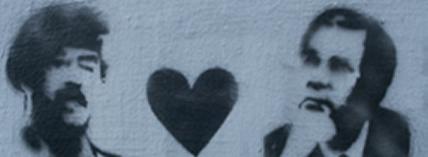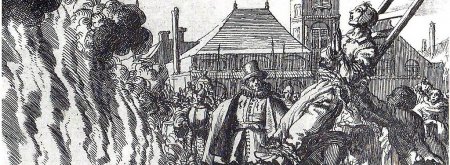Does Religion Cause War?
As the situation in Gaza becomes worse by the day, the apologetic challenge this weekend is most likely to centre on the role of religion in fomenting this conflict. The question we have probably all faced on occasions is whether religion is the main cause of war, with the suggestion being made that the world would be a much more peaceful place if only there was no religion.
Richard Dawkins has put it this way: “Religion causes war by generating certainty”. And John Lennon encouraged us to:
Imagine there's no countries
It isn't hard to do
Nothing to kill or die for
And no religion too
Imagine all the people
Living life in peace
Well, we all want to ‘live life in peace’; the question is whether removing religion is what will achieve it. In a great article on the bethinking website, Tom Price details a range of responses we can make to this challenge including the following: atheist secularism has caused just as much bloodshed; it’s an abuse of Christianity that has led to violence not its genuine practice; ultimately it’s people that kill, not religion.
In his book, The Gods of War: Is Religion the Primary Cause of Violent Conflict?, the historian, Meic Pearse, addresses all of these points and more. In relation to the first, he takes us though what he calls ‘The bloodiest century of all’, namely the twentieth, demonstrating how a range of secular ideologies have left a trail of death and destruction in their wake. As readers of the comment section of FNT will know, though, this fact is resisted by many atheists, including those who regularly post responses to these articles.
An interesting case in point here concerns Che Guevara whose violence is sometimes airbrushed away in a desire by secularists to ignore the atrocities of atheist communism. So the actor who plays him in the newly released film has said, "I never knew much about Che as a kid, I only knew one side, that he was a bad guy. But I remember…seeing a picture of Che and he had a really warm smile. I thought there was something wrong, so I got a book and…I started to learn a little bit the love that people felt for this man." Contrast that with Che’s own words written to his mother from prison, “I am no Christ, nor a philanthropist. I am the very opposite of Christ…I will fight with all the arms within reach.” When society is at a stage that someone’s ‘warm smile’ is enough to make us ignore the direct bloodshed they have perpetrated then we are in a dangerous, if not delusional, place. This, I would suggest, applies to all those secularists who refuse to accept the reality of the violence that Hitler, Mao and Stalin were engaged in and which flowed directly from their rejection of the God of Jesus Christ. Pearse rightly concludes his chapter with these words, “Irreligion has proved far more lethal than religion ever was.”
The crucial point here is: What is the central message of the ideology in question? Some of our atheists who respond to FNT seem to miss the fact that ultimately we do not follow Christians, we follow Christ. It is what he said and did that matters, as it is on Him that our faith rests. And his message was one of unqualified love, the eschewment of violence, and the centrality of forgiveness. It is Christ who defines Christianity, not those who have committed atrocities in its name.
So, does religion cause war? Sadly, it does. But does Jesus Christ, and do those who submit themselves wholeheartedly to Him and His teaching? No. He was the Prince of Peace and he remains the only hope for real peace – even, perhaps especially, in the Middle East.
© 2009 Justin Thacker
Used by kind permission of the author.
This article first appeared on the Evangelical Alliance's Friday Night Theology website.
The Evangelical Alliance’s Friday Night Theology e-mail provides a weekly comment on a topical event to help evangelism. Sign up for free at www.eauk.org/fnt.



